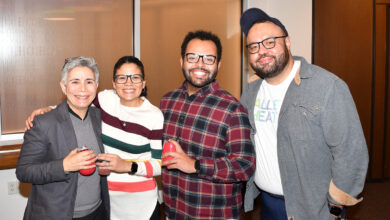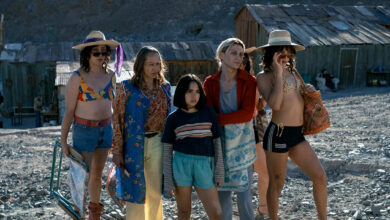
‘Blame It on Valentine, Texas’

The creator of ‘Greater Tuna’ brings a new show to Galveston this month.
by Rich Arenschieldt
Photo by Brenda Ladd
Jaston Williams, the man most closely associated with such mythical locales as Tuna, Texas (the state’s third-smallest town), Didi’s Used Weapons Store (whose motto is “If we can’t kill it, it’s immortal”), and the Tastee Kreme Diner, returns to Galveston’s Grand 1894 Opera House for his new solo show, Blame It on Valentine, Texas, on June 15.
“One of my inspirations for Valentine came from something that happened almost a decade ago,” Williams says. “We were in Austin doing Tuna and I was at the gym working out and had a pain in my chest, which I ignored. It worsened and I ended up in the hospital, thinking I was having a heart attack. After several days of testing, it was found to be something less serious, but the process of facing my mortality for the first time was cathartic. What I learned was this: the best near-death experience to have is one where you aren’t really that ‘near death.’ You get all the benefits of a quick retrospective of your life—and then you live.”
“While in the hospital, I spent a lot of time thinking about what I hadn’t done—places I hadn’t been, plays I hadn’t written, you name it. Tuna had been running for twenty-five years, and with that kind of success it was easy to become complacent,” Williams says. “People love the show and I appreciate that deeply, but I realized there was a lot of other stuff I needed to do.” Williams returned to his cabin on Lake Travis and began to work.

Childhood memories appear in much of Williams’s works, and Valentine incorporates many of them. “While at the cabin, I woke up in the middle of the night having dreamt of an event from my boyhood in a tiny west Texas town. In the dream I was about to be attacked by a very large and ferocious pig when a hired hand on our farm intervened and actually saved my life.” A second but equally chaotic inspiration for Valentine was Williams’s ill-fated theatrical debut. “At the tender age of four, my mother enrolled me in a ballet class—something that explains my current marital status,” Williams says. “During the performance, I missed all of my cues, angered all the little girls in the ‘corps-de-ballet’ and had what adults would call a ‘nervous breakdown’ onstage. Of course I felt compelled to write about both experiences.
“Later, when I read what I had written, I realized that I was speaking with a ‘new voice,’ one that was completely devoid of fear or concern for what others may think. I just kept writing, and Valentine is the end product of those (and other) recollections.”
Fans of Greater Tuna have come to expect a certain type of product from Williams—a zany cast of gender-bent characters intertwined in oddball circumstances. “Tuna has been such a joy to me over the years,” Williams says, “but I have material that is important to me and, in some cases, is just as good or better than what audiences have seen before. Valentine is, in many ways, more meaningful.”
Williams’s new theatrical ‘voice’ is borne of a certain fearlessness that may surprise audiences. “You can’t be on the road in the American theater for thirty years without undergoing some significant transformation,” Williams says. “You can elect to repeat the same things that have worked in the past, or you can choose to embrace changes without worrying about what your fans will think. I know what I want to say, and I think audiences will be interested to hear it.”
As with any artist, Williams’s craft is heavily influenced by personal experience. “Ten years ago I was living a rather exotic existence in New Orleans’ French Quarter, in a fabulous house with lots of unusual and interesting friends,” Williams says. “Life, for me, has changed. Recently, several significant things have happened,” Williams continues. “My partner and I got married in Canada and we have a special-needs child that we adopted from China. Both of these events are present in Valentine.”
A second opportunity for fatherhood has been the catalyst for much of this transformation. (Williams was married at a young age and had a son who died in an accident). “I felt a strong need to ‘parent’ again,” Williams says. “I used to sit and have drinks on a veranda in The Quarter; now I’m the taxi service for a youngster enrolled in a special-needs school, and I couldn’t be happier.” Having a family has enhanced the sense of connection that Williams feels with others, something evident in the “community” of characters that inhabit Valentine.
“Everybody has a connection with a small town somewhere,” Williams says. “The characters in these places are often the same, regardless of where the town is located. Interestingly, many people move to a small town because they meet and fall in love with someone who lives in a place like Valentine. Also, many ballet teachers, artists, and musicians teach children from these dinky little hamlets. Like me, some grow up to live and work in the arts. I was a terrible dancer, but I was introduced to an audience and discovered the power of theater—all as the result of that one dreadful dance recital.”
What: Blame It on Valentine, Texas
When: Two performances, Saturday, June 15, at 2 and 8 p.m.
Where: Galveston’s Grand 1894 Opera House
Tickets/information: thegrand.com or 800/821-1894.
Rich Arenschieldt is a frequent contributor to OutSmart magazine.










